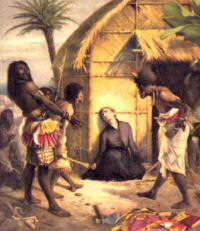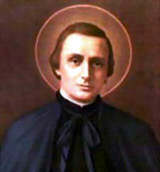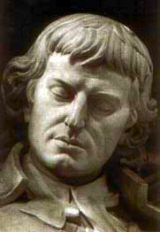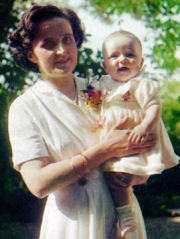Saint Louis Mary de Montfort, Priest
Optional Memorial
April 28th

from a 1905 Prayer card
History:
Missionary in Brittany and Vendee; born at Montfort, January 31, 1673; died at Saint Laurent sur Sevre, April 28, 1716. From his childhood, he was devoted to prayer before the Blessed Sacrament. At the age of 12, he was sent as a day pupil to the Jesuit college at Rennes, he never failed to visit the church before and after class. He joined a society of young men who during holidays ministered to the poor and to the incurables in the hospitals, and read for them edifying books during their meals. At the age of nineteen, he went on foot to Paris to follow the course in theology, gave away on the journey all his money to the poor, exchanged clothing with them, and made a vow to subsist thenceforth only on alms. He was ordained priest at the age of twenty-seven, and for some time fulfilled the duties of chaplain in a hospital. In 1705, when he was thirty-two, he found his true vocation, and thereafter devoted himself to preaching to the people. During seventeen years he preached the Gospel in countless towns and villages. As an orator he was highly gifted, his language being simple but replete with fire and divine love. His whole life was conspicuous for virtues difficult for modern degeneracy to comprehend: constant prayer, love of the poor, poverty carried to an unheard-of degree, joy in humiliations and persecutions. The following two instances will illustrate his success. He once gave a mission for the soldiers of the garrison at La Rochelle, and moved by his words, the men wept, and cried aloud for the forgiveness of their sins. In the procession which terminated this mission, an officer walked at the head, barefooted and carrying a banner, and the soldiers, also barefooted, followed, carrying in one hand a crucifix, in the other a rosary, and singing hymns. Father de Montfort 's extraordinary influence was especially apparent in the matter of the calvary at Pontchateau. When he announced his determination of building a monumental calvary on a neighbouring hill, the idea was enthusiastically received by the inhabitants. For fifteen months between two and four hundred peasants worked daily without recompense, and the task had just been completed, when the king commanded that the whole should be demolished, and the land restored to its former condition. The Jansenists had convinced the Governor of Brittany that a fortress capable of affording aid to persons in revolt was being erected, and for several months five hundred peasants, watched by a company of soldiers, were compelled to carry out the work of destruction. Father de Montfort was not disturbed on receiving this humiliating news, exclaiming only: "Blessed be God!"
This was by no means the only trial to which Father de Montfort was subjected. It often happened that the Jansenists, irritated by his success, secure by their intrigues his banishment form the district,in which he was giving a mission. At La Rochelle some wretches put poison into his cup of broth, and, despite the antidote which he swallowed, his health was always impaired. On another occasion, some malefactors hid in a narrow street with the intention of assassinating him, but he had a presentiment of danger and escaped by going by another street. A year before his death, Father de Montfort founded two congregations -- the Sisters of Wisdom, who were to devote themselves to hospital work and the instruction of poor girls, and the Company of Mary, composed of missionaries. He had long cherished these projects but circumstances had hindered their execution, and, humanly speaking, the work appeared to have failed at his death, since these congregations numbered respectively only four sisters and two priests with a few brothers. But the blessed founder, who had on several occasions shown himself possessed of the gift of prophecy, knew that the tree would grow. At the beginning of the twentieth century the Sisters of Wisdom numbered five thousand, and were spread throughout every country; they possessed forty four houses, and gave instruction to 60,000 children. After the death of its founder, the Company of Mary was governed for 39 years by Father Mulot. He had at first refused to join de Montfort in his missionary labors. "I cannot become a missionary", said he, "for I have been paralysed on one side for years; I have an affection of the lungs which scarcely allows me to breathe, and am indeed so ill that I have no rest day or night." But the holy man, impelled by a sudden inspiration, replied, "As soon as you begin to preach you will be completely cured." And the event justified the prediction. Louis de Montfort was beatified by Leo XIII in 1888.
St. Louis de Montfort was canonized by Pius XII in 1947.
(Principal source - Catholic Encyclopedia - 1913 edition)
Collect:
O God, who willed to direct the steps of the Priest Saint Louis
along the way of salvation and of the love of Christ,
in the company of the Blessed Virgin,
grant us, by his example,
that, meditating on the mysteries of your love,
we may strive tirelessly for the building up of your Church.
Through our Lord Jesus Christ, your Son,
who lives and reigns with you in the unity of the Holy Spirit,
one God, for ever and ever. +Amen.
or
Almighty and eternal God, who made the Priest Saint Louis
an outstanding witness and teacher
of total devotion to Christ your Son
through the hands of his Blessed Mother,
grant us that, following the same spiritual path,
we may constantly spread your Kingdom.
Through our Lord Jesus Christ, your Son,
who lives and reigns with you in the unity of the Holy Spirit,
one God, for ever and ever. +Amen.
First Reading: 1 Corinthians 1:18-25
For the word of the cross is folly to those who are perishing, but to us who are being saved it is the power of God. For it is written, "I will destroy the wisdom of the wise, and the cleverness of the clever I will thwart." Where is the wise man? Where is the scribe? Where is the debater of this age? Has not God made foolish the wisdom of the world? For since, in the wisdom of God, the world did not know God through wisdom, it pleased God through the folly of what we preach to save those who believe. For Jews demand signs and Greeks seek wisdom, but we preach Christ crucified, a stumbling block to Jews and folly to Gentiles, but to those who are called, both Jews and Greeks, Christ the power of God and the wisdom of God. For the foolishness of God is wiser than men, and the weakness of God is stronger than men.
Gospel Reading: Matthew 28:16-20
Now the eleven disciples went to Galilee, to the mountain to which Jesus had directed them. And when they saw Him they worshipped Him; but some doubted. And Jesus came and said to them, "All authority in heaven and on earth has been given to Me. Go therefore and make disciples of all nations, baptizing them in the name of the Father and of the Son and of the Holy Spirit, teaching them to observe all that I have commanded you; and lo, I am with you always, to the close of the age."





